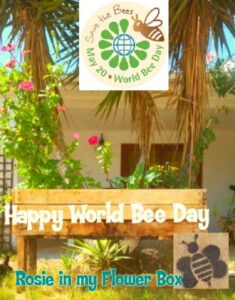For centuries bees, busy as they are known to be, have benefited people, plants and the planet. But did you know that bees are not the only ones that sustain life on earth? By carrying pollen from one flower to another, bees, butterflies, birds, bats and other pollinators facilitate and improve food production, thus contributing to food security and nutrition. Pollination also has a positive impact on the environment in general, helping to maintain biodiversity and the vibrant ecosystems upon which agriculture depends.
THE IMPORTANCE OF CELEBRATING WORLD BEE DAY
Observing World Bee Day on 20 May each year will draw attention to the essential role bees and other pollinators play in keeping people and the planet healthy. It provides an opportunity for governments, organizations, civil society and concerned citizens everywhere to promote actions that will protect and enhance pollinators and their habitats, improve their abundance and diversity, and support the sustainable development of beekeeping.
The date for this observance was chosen as it was the day Anton Janša, a pioneer of modern apiculture, was born. Janša came from a family of beekeepers in Slovenia, where beekeeping is an important agricultural activity with a long-standing tradition.
The proposal set forth by the Republic of Slovenia, with the support of Apimondia, the International Federation of Beekeepers’ Associations and FAO, to celebrate World Bee Day on 20 May each year met with approval by the United Nations General Assembly in 2017.
World Bee Day intends to shine a light on the habitat of pollinators to improve the conditions for their survival so that bees and other pollinators may thrive.
POLLINATION AND ZERO HUNGER
What do bees have to do with achieving Zero Hunger, one of the 17 Sustainable Development Goals? Quite a lot, actually. Close to three-quarters of the world’s crop species depend, at least in part, on bees and other pollinators, conforming to the major characteristics of the 2030 Agenda for Sustainable Development, nourishing people and nurturing the planet. Pollinators play an essential role in helping to feed a rising world population in a sustainable way and help maintain biodiversity and a vibrant ecosystem. They contribute to building resilient livelihoods and creating new jobs, for poor smallholder farmers in particular, satisfying the growing demand for healthy, nutritious food as well as non-food products.
The worrying decline in the number of pollinators, largely brought about by intensive agricultural practices, changes in land use, use of pesticides and by more extreme weather events, is related to pest and disease outbreaks, and higher levels of malnutrition and non-communicable diseases, provoking health issues for populations around the world.
Already the highest agricultural contributor to yields worldwide, pollination, with improved management, has the potential to increase yield by a quarter.
THE WAY FORWARD
To protect bees and pollinators from the threats to their abundance, diversity and health, efforts should be made to build a greater diversity of pollinator habitats in agricultural and urban settings. Policies in favour of pollinators that promote biological pest control and limit the use of pesticides should be implemented.
Farmers can help maintain pollinator abundance, diversity and health by using innovative practices that integrate local and scientific knowledge and experience and by diversifying farms to make food resources and shelter continuously available to pollinators. We need to increase collaboration among national and international organizations, academic and research bodies and networks to monitor, research and assess pollinators and pollination services.
We all have a chance to grow our appreciation for bees and other pollinators, especially on 20 May, or World Bee Day.
For more information on how you can contribute in any capacity, please contact:
Rosie in my Flower and Herb Box on Facebook
https://www.facebook.com/RosieinmyFlowerandHerbBox/
Promoting pollination one Flower and Herb BOX at a time and making a difference!
xoxo
Rosie










